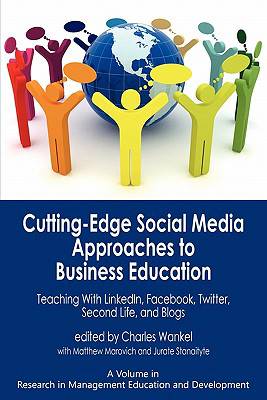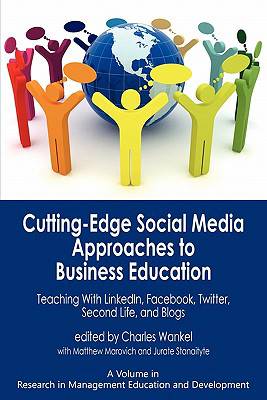
- Afhalen na 1 uur in een winkel met voorraad
- Gratis thuislevering in België vanaf € 30
- Ruim aanbod met 7 miljoen producten
- Afhalen na 1 uur in een winkel met voorraad
- Gratis thuislevering in België vanaf € 30
- Ruim aanbod met 7 miljoen producten
Zoeken
Cutting-Edge Social Media Approaches to Business Education
Teaching with Linkedin, Facebook, Twitter, Second Life, and Blogs (PB)
Charles Wankel
€ 66,45
+ 132 punten
Uitvoering
Omschrijving
A volume in Research in Management Education and Development Series Editors: Charles Wankel, St. John's University Our current students are digital natives, born into a world of widespread online sharing. Aligning the technologies we use in our courses with their skills and approaches to collaborative learning is an opportunity we should take. The new media share text, images, audio and video material rapidly and interactively. This volume will provide an overview of these new social media including Skype, YouTube, Flickr, blogging, LinkedIn, Facebook, and Twitter. Examples and cases of how instructors around the world are meaningfully incorporating them into their management, marketing, and other business courses are provided. One of the more robust trends is the use of three-dimensional immersive virtual world interfaces for teaching and learning. The leading one is Second Life. Examples of the use of Second Life in business courses will be discussed. The use of wikis to foster collaborative development of course related material by learners will be presented with case examples. Faculty members are co-creators of course content with their learners. Among the topics covered is how faculty members can be supported in their deployment of social media projects and course structures. How social media can enable the structuring of course activities involving students, prospective students, alumni, employers, businesspersons, and others in rich sharing and support with each other will be discussed. Indeed seeing courses as networking venues beyond learning forums will be parsed.
Specificaties
Betrokkenen
- Auteur(s):
- Uitgeverij:
Inhoud
- Aantal bladzijden:
- 352
- Taal:
- Engels
- Reeks:
Eigenschappen
- Productcode (EAN):
- 9781617351167
- Verschijningsdatum:
- 27/07/2010
- Uitvoering:
- Paperback
- Formaat:
- Trade paperback (VS)
- Afmetingen:
- 156 mm x 234 mm
- Gewicht:
- 494 g

Alleen bij Standaard Boekhandel
+ 132 punten op je klantenkaart van Standaard Boekhandel
Beoordelingen
We publiceren alleen reviews die voldoen aan de voorwaarden voor reviews. Bekijk onze voorwaarden voor reviews.











